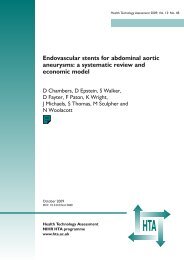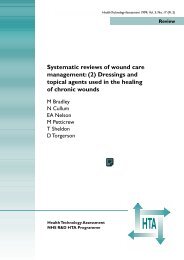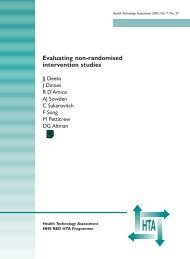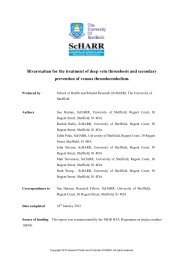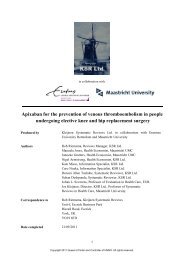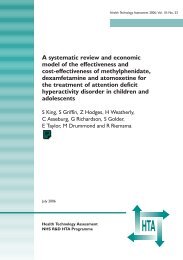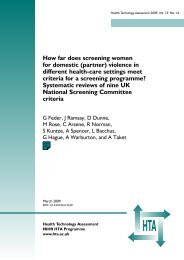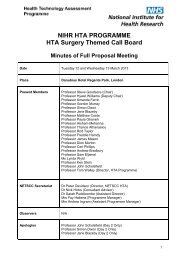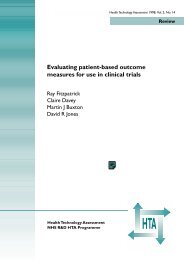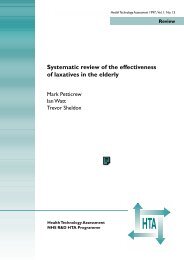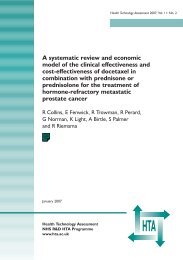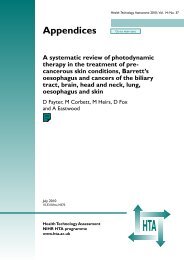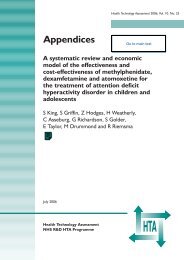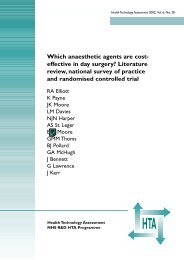Donepezil, rivastigmine, galantamine and memantine for ...
Donepezil, rivastigmine, galantamine and memantine for ...
Donepezil, rivastigmine, galantamine and memantine for ...
You also want an ePaper? Increase the reach of your titles
YUMPU automatically turns print PDFs into web optimized ePapers that Google loves.
44<br />
Clinical effectiveness<br />
Comparison:<br />
Outcome:<br />
Study<br />
Corey-bloom 1998 riv<br />
Rosler 1999 riv<br />
06 Rivastigmine: ADAS-cog change from baseline<br />
01 Rivastigmine 1–4 mg<br />
Treatment<br />
n<br />
233<br />
243<br />
Mean<br />
(SD)<br />
2.36 (6.00)<br />
1.37 (6.90)<br />
Control<br />
n<br />
234<br />
239<br />
found when combining the studies <strong>for</strong> the<br />
6–12 mg/day dose group ( 2 test 8.17, df = 1,<br />
p = 0.0043), so the statistically significant<br />
treatment effect seen <strong>for</strong> the fixed-effect model<br />
combining the two trials with this dosage group is<br />
not valid (WMD –3.08, 95% CI –3.78 to –2.38,<br />
p < 0.00001) (see Figure 12). Exploration of this<br />
statistical heterogeneity by subgroup analysis was<br />
not appropriate owing to the small numbers of<br />
included trials in the meta-analysis.<br />
[Commercial/academic confidential in<strong>for</strong>mation<br />
removed]<br />
MMSE<br />
Three of the four published studies reported<br />
MMSE as an outcome measure (Table 16). Two of<br />
these reported mean baseline scores of 19–20, 57,58<br />
but baseline values were not reported in the other<br />
study. The first study compared two fixed-dose<br />
groups (4 <strong>and</strong> 6 mg/day) with placebo, <strong>and</strong> the<br />
other two studies compared two flexible dose<br />
groups (1–4 <strong>and</strong> 6–12 mg/day) with placebo. The<br />
Mean<br />
(SD)<br />
4.09 (2.90)<br />
1.34 (7.00)<br />
WMD<br />
(95% CI fixed)<br />
Weight<br />
%<br />
67.8<br />
32.2<br />
WMD<br />
(95% CI fixed)<br />
–1.73 (–2.59 to –0.87)<br />
0.03 (–1.21 to 1.27)<br />
Total (95% CI)<br />
Test <strong>for</strong> heterogeneity 2 476 473 100.0 –1.16 (–1.87 to –0.46)<br />
= 5.24, df = 1, p = 0.022<br />
Test <strong>for</strong> overall effect z = 3.24, p = 0.001<br />
FIGURE 11 ADAS-cog change from baseline with <strong>rivastigmine</strong> 1–4 mg<br />
Comparison:<br />
Outcome:<br />
Study<br />
Corey-bloom 1998 riv<br />
Rosler 1999 riv<br />
06 Rivastigmine: ADAS-cog change from baseline<br />
02 Rivastigmine 6–12 mg<br />
Treatment<br />
n<br />
231<br />
243<br />
Mean<br />
(SD)<br />
0.31 (5.90)<br />
–0.26 (6.80)<br />
Control<br />
n<br />
234<br />
239<br />
–10 –5 0 5 10<br />
Favours treatment Favours control<br />
Mean<br />
(SD)<br />
4.09 (2.90)<br />
1.34 (7.00)<br />
67.9<br />
32.1<br />
–3.78 (–4.63 to –2.93)<br />
–1.60 (–2.83 to –0.37)<br />
Total (95% CI)<br />
Test <strong>for</strong> heterogeneity 2 474 473 100.0 –3.08 (–3.78 to –2.38)<br />
= 8.17, df = 1, p = 0.0043<br />
Test <strong>for</strong> overall effect z = 8.65, p < 0.00001<br />
FIGURE 12 ADAS-cog change from baseline with <strong>rivastigmine</strong> 6–12 mg<br />
WMD<br />
(95% CI fixed)<br />
Weight<br />
%<br />
–10 –5 0 5 10<br />
Favours treatment Favours control<br />
WMD<br />
(95% CI fixed)<br />
fixed-dose study did not report any statistically<br />
significant differences between treatment groups<br />
<strong>and</strong> placebo <strong>for</strong> this outcome measure. Both of the<br />
flexible dose studies reported a statistically<br />
significant difference between the high dose<br />
treatment group <strong>and</strong> placebo. The high-dose<br />
participants in both studies had a mean dose of<br />
~10 mg/day. Corey-Bloom <strong>and</strong> colleagues 57 used<br />
observed case analysis <strong>for</strong> this outcome measure,<br />
<strong>and</strong> found an improvement in the high-dose<br />
group of 0.30 points, compared with a decline in<br />
placebo participants of –0.79 points. The other<br />
flexible dose study 58 used ITT analysis, <strong>and</strong><br />
reported an improvement in the high-dose group<br />
of 0.21 points compared with a decline in placebo<br />
participants’ scores of –0.47. In this study, the lowdose<br />
participants also showed a decline in MMSE<br />
score, with a mean change of –0.62, but this was<br />
not statistically significantly different from the<br />
placebo group.<br />
[Commercial/academic confidential in<strong>for</strong>mation<br />
removed]



